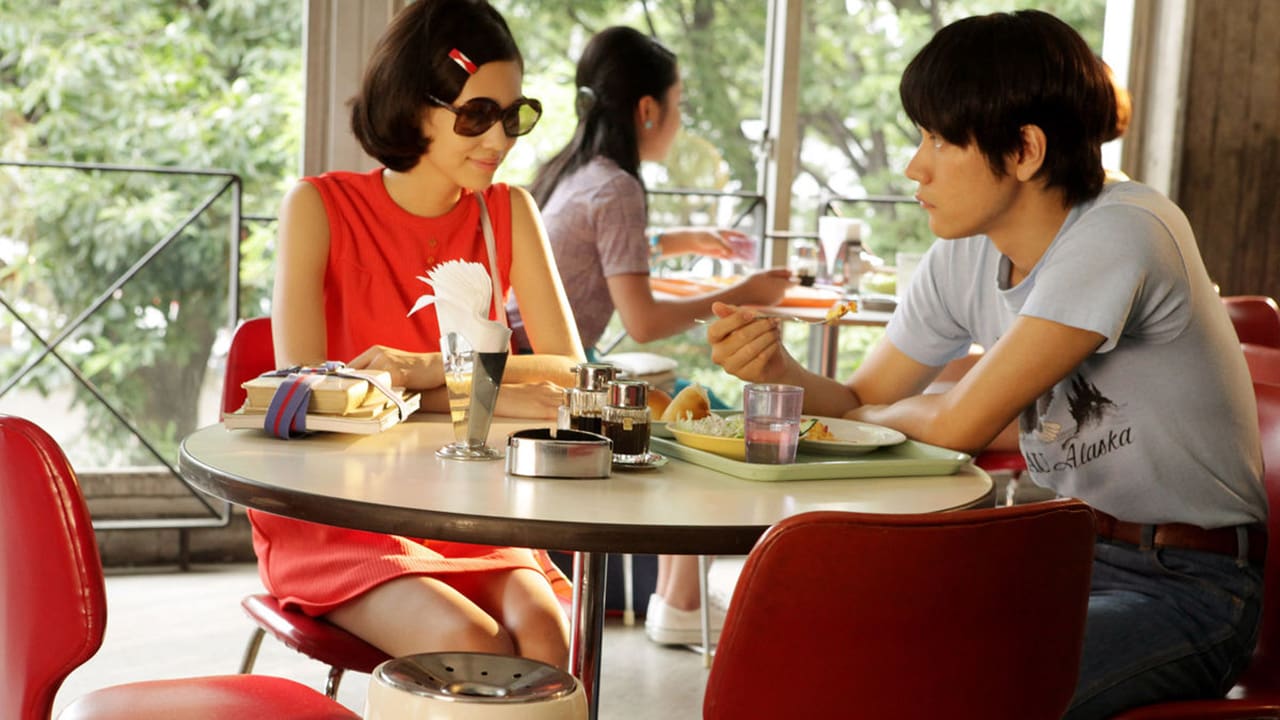

*SPOILER ALERT , DO NOT READ IF YOU HAVEN'T WATCHED THE MOVIE , OR SEEN THE BOOK* __________________________________________"Norwegian Wood" was a movie adaption for one of the best-sellers , and arguably one of the finest works of Haruki . First of all , the visual was gorgeously beautiful , just as what you can expect from a romantic Japanese film , the atmosphere was very calm and reflective , combined together it makes the movie look very gentle and peaceful , which created the necessary depth for this tragedy-themed title . The acting was fantastic , there was no overacting in this movie , their tenderly expressions totally synced well with the pace & atmosphere of this film . Overall they did an excellent job But here's one serious problem in my opinion : The movie failed to connect the movie as a whole , i know there's no way anyone can fully bring in every detail in a book to a 2-hours movie , but they could have done better . *Spoiler alert again* For example , i was okay with them skipping some of the interesting dialogues in the book , but they should have replaced that void with something else , like a more talk-active narrator . There are scenes that don't truly fit to the next scenes , and if you never read the book you may feel a little bit confused , and for people who had read the book , i've seen many of them feeling frustrated after they watched the movie .Also they neglected Reiko's story , which i think that it was a bad decision . At near the end of the movie , her appearance and what she did just seemed so out of place , it was so random and doesn't make good sense . And Midori was supposed to be more lively than that , i remember me and some other guys were a bit surprised when we watched it for the first time , at one point one random dude in the cinema yelled "wtf" when Reiko asks Toru to sleep with her . If only there was a more well-detailed narrative , the movie would be so much better . Despite the flaws , i'd still recommend you to watch this movie if you are into light , gentle , bittersweet depressing type of love stories . This movie is not for everyone , but i'm damn sure it's worth a try !p/s : The name is "Norwegian Wood" but the movie doesn't actually set in Norway , or within a wood . WATCH WITH CAUTION
... View MoreWatched this in an effort to get into Murakami in an effort to actually read fictions. Absolutely loving it. Murakami's stories (or at least this adaptation) doesn't seem as messed-up as I try to expect it to be. But then again I've watched Oldboy, so everything else is tame in comparison.I haven't read the book, but watching this film made me believe that everyone has their own struggles in the past, and Tran Anh Hung succeeded in delivering it in such few shots, especially for side characters such as Nagasawa, Natsumi, and Reiko.So I'm gonna go in-depth on why I love each and every single character in this film, and how are they so, human.Nagasawa: He's a great friend, but we all can agree that he's a dick to Natsumi. He is almost too simple of a character until his final advice to Watanabe revealed something. He said, "Don't ever feel sorry for yourself, only degenerates feel that way." It showed that he probably has battled with self-esteem issues in the past, and he had come far to get to where he is right now. Was it family abuse? He's also very ambitious, did he came out from poverty? Natsumi: She loves Nagasawa so much, almost unconditionally. It's the greatest feeling in the world, also the worst. The moment she killed herself, albeit being told in narrative, was the most heart-breaking moment in the film for me.Midori: Despite coming from a broken home, she decides to stay optimistic. Flirtatious, but respect the social contract of being in a relationship, hence she only fully came out to Watanabe after she broke up, and still wait for him to settle things with his other love interest.My favorite moment of Midori is when she talked about of her idea of love. She want to be pampered, loved, and protected, it all sounded almost selfish. But I appreciate her honesty. She just don't want to be hurt again.Reiko: She is portrayed as the mentor figure in the film, especially with the sensei title. But all the while she was accompanying the couple, I couldn't help but wonder, how does she feels? She's a human being too, a woman. She also deserves to have the feeling of companionship.I was partly relieved for the end scene with Watanabe. Though I genuinely panicked for him (he promised to go back straight to Midori, but he also shouldn't refuse Reiko as she, too, deserve happiness), I was relieved that Reiko was given the chance to re-discover what she has long lost.Naoko: We never really know what made her plunged too deep into depression and schizophrenia, but we know that she was in a lot of pain. Too much pain. Unsure of her real feelings towards Kitsuki, inability to really experience physical intimacy, hopelessness, not getting answers, too much.I can't articulate enough on how I relate to her the most, but I do.Kitsuko: He's someone interesting. Very short airtime in the film, but only towards the end we can sympathize what Kitsuki had to go through. One of it being, unable to make Naoko happy? Watanabe: He's the guy who has to take everything in, from everyone in his life. Except during the time Kitsuko, and later Naoko, kill themselves, he never showed much reaction. Naoko showed up after years of disappearance? Okay. Disappear again? Okay. Midori flirted with him and describing very visual sexual encounter? Okay. She got mad and cut contact with him? Okay. Nagasawa and Natsumi making the dinner uncomfortable? Okay. Reiko came back asking to sleep together? Okay. OMG WHAT'S WRONG WITH YOU PEOPLE IN WATANABE'S LIFE.What I love most about him, however, is his overbearing sense of responsibility towards Naoko. Like what he told Midori, even if hypothetically he doesn't love Naoko, he still have to be with her. Poignant, but beautiful.Well that's it. I'm grateful I watched this as there are too many things to take away from. Putting this into words so I will have a record on how I feel about the story, before getting into the book!
... View MoreWell... This is my first review, but I try to keep it short.SPOILER!!This movie is not for everyone, but not because of the sex-scenes, or the suicides. You can not get the whole picture of the story, after seeing it, 'cause there are really big holes in the plot. Holding back information from the viewer is not making it more mysterious, only confusing everything up. The ending of the movie is slightly different from the book. It's a bit more direct, but it's also leaves you to imagine future of the main character.SPOILER OFFDo not watch this film, before reading the original book, from Mr.Murakami Haruki. Trust me, you'll need it, because the cast of the film is not so good, to channel all the emotions of the story.BUT, don not read the book, or watch the film, if you're not into sad, romantic dramas. It's the best, if you're going to watch it with you boy/girlfriend, some hugs at the end should come in handy :)
... View MoreThis pretentious movie is beyond art-house-cinema at its worst, because it isn't art. Because it has no touch what so ever with human emotions it is unbearable to watch, and you cannot help feeling, that it must all of sudden turn into a comedy - but unfortunately it does not. It wants to be a movie about sexuality and loss, but since it is made by the mind of a materialist it looks and feels like a series of scenes with abused young actors in a bad commercial for a dress-label and a Russian vodka. It wants to show off and take an existential view on the important and always vivid subject of coming-of-age, but the level of wisdom and spiritual depth is perhaps the most shallow, I have seen since "plan 9 from outer space". Watch Bille August "Zappa" or Jacob Aron Estes' "Mean creek" instead.
... View More